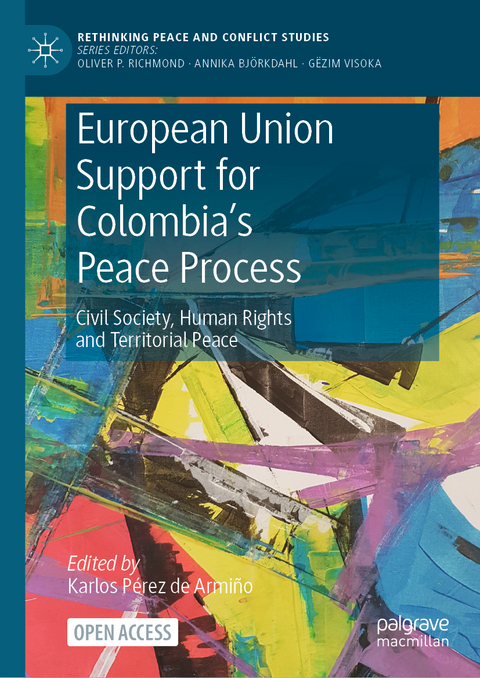
European Union Support for Colombia's Peace Process
Springer International Publishing (Verlag)
978-3-031-24796-5 (ISBN)
This open access book provides a comprehensive analysis of the EU's crucial support for the implementation of the Havana Peace Agreement between the Colombian government and the FARC-EP. It explores the use of new approaches and instruments that, despite some limitations and criticisms, could go beyond conventional liberal peace and provide useful lessons. Particular attention is paid to three axes: strengthening civil society, protection of human rights and a territorial peace perspective, as a contribution to the "local turn" in peace policies. The book first outlines the background of the conflict, the EU's two-decade defense of a negotiated peace, and the complexities of the peace process. Then, it analyses the development cooperation and political support provided in different areas: the collective reinsertion of ex-guerrillas, women and gender initiatives, the rights of ethnic communities, the sophisticated transitional justice system, as well as activities on reconciliation,victims and protection of human rights defenders.
lt;p>Karlos Pérez de Armiño is Associate Professor of International Relations at the University of the Basque Country (UPV/EHU), Bilbao. Research fellow and former director (2015-2021) of Hegoa, Institute for International Cooperation and Development Studies. His research interests include critical approaches to peacebuilding, EU peacebuilding policies, human security, humanitarian action, and conflicts and famines.
Chapter 1. EU support for peace in Colombia. Contributions from the territorial approach, the strengthening of civil society and the defence of human rights. (Karlos Pérez de Armiño. University of the Basque Country, UPV/EHU).- Chapter 2. The recent context in Colombia in historical and territorial perspective: Armed conflict, the Havana Agreements and their implementation (Jerónimo Ríos. Complutense University of Madrid).- Chapter 3. EU development cooperation in Colombia and support for peacebuilding. A historical perspective. (Juana García Duque. University of the Andes, Bogotá).- Chapter 4. Multilevel support for the process for the reincorporation of FARC-EP: The experience of the EU Trust Fund (Carlos Madridejos. University of the Basque Country).- Chapter 5. A review of the European Union's gender approach in its support to the peace process in Colombia (Irantzu Mendia. University of the Basque Country).- Chapter 6. The European Union's contribution to the implementation of theethnic approach within the Colombian Peace Agreement (2016-2021) (Alba Linares, University of the Basque Country), etc.
| Erscheinungsdatum | 31.05.2023 |
|---|---|
| Reihe/Serie | Rethinking Peace and Conflict Studies |
| Zusatzinfo | XXI, 402 p. 4 illus., 2 illus. in color. |
| Verlagsort | Cham |
| Sprache | englisch |
| Maße | 148 x 210 mm |
| Gewicht | 678 g |
| Themenwelt | Sozialwissenschaften ► Politik / Verwaltung ► Europäische / Internationale Politik |
| Sozialwissenschaften ► Politik / Verwaltung ► Vergleichende Politikwissenschaften | |
| Schlagworte | armed conflicts • Civil Society • Colombia • Colombian peace process • Development Cooperation and Peacebuilding • EU • European Union • Havana Agreements • Human Rights • open access • Peacebuilding • Territorial Peace • the Colombian Peace Agreement • Transitional Justice • truth commission |
| ISBN-10 | 3-031-24796-5 / 3031247965 |
| ISBN-13 | 978-3-031-24796-5 / 9783031247965 |
| Zustand | Neuware |
| Haben Sie eine Frage zum Produkt? |
aus dem Bereich


